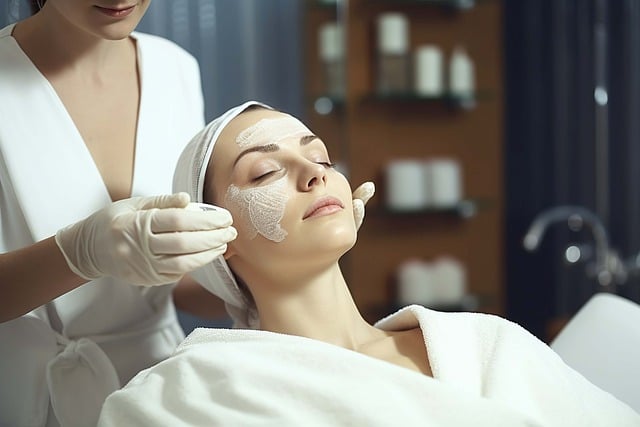Decoding Skincare: Products for Smooth, Radiant Skin by Type
Beauty products' role in promoting skin smoothness is rooted in dermatological and cosmetic ch…….

Beauty products' role in promoting skin smoothness is rooted in dermatological and cosmetic chemistry principles, utilizing active ingredients like hyaluronic acid, glycolic acid, and retinoids to enhance skin texture and radiance. Hyaluronic acid naturally moisturizes the skin, while glycolic acid exfoliates dead cells and retinoids encourage collagen production for lasting smoothing effects. Selecting products suitable for one's skin type—be it normal, dry, oily, sensitive, or acne-prone—is crucial due to varying skin needs and reactions to ingredients. For instance, those with dry skin benefit from rich, hydrating creams, while oily skin requires products that regulate sebum production. Sensitive skin demands gentle formulas, and acne-prone skin should use targeted treatments under a dermatologist's guidance. Regardless of skin type, it's important to introduce new skincare products gradually and consistently apply sun protection. A tailored skincare routine, possibly with the help of a professional, is essential for achieving smoother and more luminous skin, considering individual concerns and conditions.
Are you curious about the role beauty products play in enhancing skin smoothness and radiance? The landscape of skincare is vast and varied, with numerous products promising a glowing complexion. Yet, the question remains: Do these products deliver on their promises? This article delves into the science behind beauty products and their effects on skin texture, shedding light on how different ingredients can cater to various skin types for optimal health and appearance. From the essentials for dry skin to solutions for oily complexions, we explore product categories that address specific dermal needs. Additionally, we’ll uncover key ingredients that contribute to smoother, more radiant skin, including hydrators, exfoliants, anti-inflammatories, and antioxidants. Understanding formulations and their impact is crucial, as is considering lifestyle factors that can influence skin condition and product efficacy. Join us as we navigate the world of skincare to discover what truly works for your skin’s unique tapestry.
- Evaluating the Science Behind Beauty Products and Skin Smoothness
- Product Categories for Optimal Skin Health by Type
- – Dry Skin Care Essentials
- – Oily Skin Solutions
- – Combination Skin Recommendations
Evaluating the Science Behind Beauty Products and Skin Smoothness

The intersection between beauty products and skin smoothness is a multifaceted subject that requires a deep dive into the scientific underpinnings of dermatology and cosmetic chemistry. Products containing active ingredients such as hyaluronic acid, glycolic acid, or retinoids are often credited with enhancing skin texture and radiance due to their ability to promote cell turnover and hydration. These substances can penetrate the skin’s layers, targeting specific aspects of its structure and function. For instance, hyaluronic acid is a natural moisturizing factor that helps to maintain skin elasticity and plumpness by binding water molecules within the skin. Glycolic acid, an alpha-hydroxy acid, exfoliates the skin’s surface, removing dead cells that contribute to rough texture. Retinoids, which include retinol and its derivatives, stimulate collagen production and have been shown to improve skin smoothness over time.
When selecting products tailored to specific skin types, it is crucial to consider the composition of the stratum corneum, the skin’s outermost layer, as well as individual skin conditions such as dryness, oiliness, sensitivity, or acne-prone tendencies. For example, individuals with dry skin may benefit from heavier creams containing ceramides and fatty acids to reinforce the skin barrier. Those with oily skin might opt for lightweight gel formulations that do not clog pores but still provide hydration and gentle exfoliation. People with sensitive skin should be cautious, choosing products with soothing ingredients like aloe vera or chamomile to avoid irritation. Regardless of skin type, the efficacy of beauty products in enhancing skin smoothness is contingent upon their formulation, active ingredient concentrations, and compatibility with individual skin biology. Consistent use as directed by a dermatologist or skincare professional, coupled with a balanced diet and adequate hydration, can yield the most favorable outcomes for smoother and more radiant skin.
Product Categories for Optimal Skin Health by Type

When addressing the myriad of beauty products available, it’s crucial to consider their suitability for different skin types. Skincare routines should be tailored to individual needs, as each skin type—normal, dry, oily, combination, sensitive, and acne-prone—requires distinct treatments. For instance, individuals with normal skin typically have a balanced complexion with few blemishes, minimal dry patches, and small pores. Products for this skin type should focus on maintaining balance; lightweight moisturizers, gentle cleansers, and sunscreens suitable for daily use are recommended.
On the other hand, those with dry skin often experience tightness, flakiness, and a lack of radiance. Hydration is key here; rich creams, nourishing oils, and serums containing hyaluronic acid or glycerin can help to replenish the skin’s moisture. Cleansers should be free from harsh sulfates that can strip the skin of its natural oils. For oily skin, which is characterized by large pores, shine, and frequent breakouts, products should focus on balancing sebum production. Beta hydroxy acids (BHAs), such as salicylic acid, can effectively unclog pores, while clay-based masks can absorb excess oil. Combination skin presents its own set of challenges, with different areas requiring different treatments; a multi-step routine that addresses each zone is ideal. Sensitive skin requires gentle, fragrance-free products to avoid irritation, while those with acne-prone skin should seek out treatments that target blemishes without over-drying the complexion, such as benzoyl peroxide or topical retinoids under the guidance of a dermatologist. Acne-targeting masks and spot treatments can also be beneficial in managing breakouts.
In each case, it’s important to introduce products gradually and monitor skin reactions. Sun protection is non-negotiable across all skin types to protect against photodamage and maintain skin health. Consulting with a dermatologist or skincare professional can further refine product choices based on individual concerns and conditions.
– Dry Skin Care Essentials

When addressing dry skin, a robust skincare regimen tailored to maintaining moisture is paramount. Products rich in humectants like hyaluronic acid are crucial for drawing and retaining moisture within the skin’s layers. A gentle, soap-free cleanser is essential to prevent stripping the skin of its natural oils. Following cleansing, applying a toner with hydrating properties can help balance the skin’s pH and prepare it for subsequent treatments.
Next, incorporating a thick, cream-based moisturizer formulated for dry skin types is essential. These moisturizers often contain emollients such as glycerin, ceramides, and fatty acids that fortify the skin’s barrier and lock in moisture. Additionally, using an occlusive like petroleum jelly or mineral oil can seal in hydration and provide a protective layer against environmental aggressors. For those requiring additional support, serums containing ingredients like squalane or niacinamide can further enhance skin texture and brightness. It’s also advisable to use a facial oil, especially one rich in omega-3, -6, and -9 fatty acids, to nourish the skin and promote a smoother, more radiant complexion. Regular exfoliation, not more than once or twice a week, with a gentle scrub or enzymatic exfoliator can also aid in removing flaky skin cells and revealing smoother skin beneath.
– Oily Skin Solutions

When addressing oily skin, the key is to select products that can regulate sebum production and maintain a matte appearance without over-drying the skin. Look for gentle cleansers formulated with salicylic acid or keratolytic agents to unclog pores without stripping the skin of its natural oils. Following cleansing, toners containing ingredients like witch hazel or alcohol-free astringents can help to remove any remaining residue and tighten the pores. For moisturizers, opt for lightweight, water-based formulations that provide hydration without contributing to oiliness. Additionally, products with absorbent properties, such as those containing clay or silica, can be effective in managing excess sebum. Sunscreens suitable for oily skin should be non-comedogenic and preferably gel or mineral-based to offer protection without causing further oil production. It’s also beneficial to incorporate treatments that contain retinoids or beta-hydroxy acids (BHAs) which can improve skin texture and turnover, leading to a smoother, clearer complexion. Always patch-test new products to ensure they do not exacerbate oiliness or cause irritation.
– Combination Skin Recommendations

When addressing skincare for combination skin, it’s crucial to tailor a regimen that balances both the dry and oily areas. Products formulated with hydrating ingredients such as hyaluronic acid can help to infuse moisture into the drier patches without exacerbating oil production on the T-zone. For instance, a gentle, gel-based cleanser is often recommended to prevent stripping the skin of its natural oils. Follow this with a lightweight, water-based moisturizer that offers broad-spectrum sun protection. In areas prone to dryness, like the cheeks, a serum containing ceramides can restore the skin’s barrier and improve texture. To manage oiliness on the forehead and nose, look for products containing salicylic acid or other keratolyptic agents that can unclog pores without over-drying. Clay-based masks can be beneficial for deep cleansing, but they should be used sparingly to avoid dehydrating the skin. Always opt for fragrance-free and non-comedogenic products to prevent irritation or acne breakouts. With a well-rounded approach that addresses both hydration needs and sebum production, combination skin can indeed appear smoother and more radiant.
In conclusion, the scientific consensus indicates that certain beauty products can indeed enhance skin smoothness and radiance. The key lies in selecting the appropriate products for your specific skin type, as outlined in our exploration of dry, oily, and combination skin care solutions. By understanding the ingredients and formulations that best suit your skin’s needs, you can effectively improve its appearance. It is advisable to prioritize gentle, science-backed skincare practices tailored to your skin’s unique characteristics for optimal results. Remember, a consistent routine, coupled with an awareness of product efficacy, is paramount in achieving and maintaining healthy, smooth, and radiant skin.